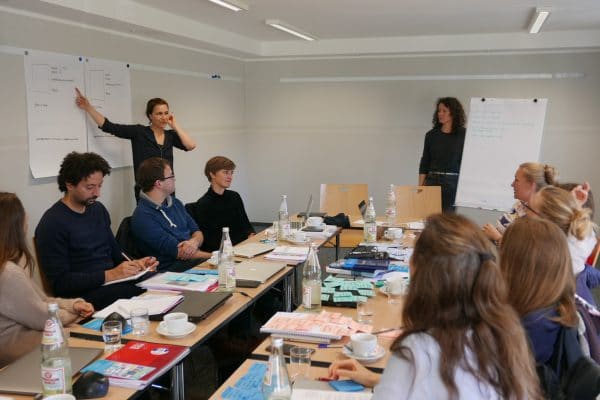Improving workflows
Most of our clients approach us because they need to make a book. They value our product-oriented methodology and are surprised by how quickly we can get different stakeholders to develop a shared understanding and reach consensus on often very complex topics. They come out of the process realising that they built a coalition across diverse fields and improved their usual workflow in terms of speed and efficiency.
Recently, we facilitated a Book Sprint at the IUBH University of Applied Sciences. Six faculty members and four of their inhouse editors came together to structure, draft, write and edit the script for an online course on “New Work” for one of IUBH’s new master programs . (You can read more about the IUBH Book Sprint in this blog post.)

IUBH Book Sprints participants: 6 faculty members, 4 inhouse editors, 1 facilitator
The IUBH scripts are usually written by individual authors. This process takes 6 to 9 months. It starts with a meeting between an author and editors, in which the content, the formal requirements and deadlines are discussed. When the author hands in the first draft after a few months, the content and structure is checked by the editors and the module supervisor and then sent back for revision.
This step is repeated at least three times until the script is finally available. It takes up a lot of time and back and forth emailing, which can become frustrating for both sides,” explains Regina Frey-Cordes, Academic Director at IUBH and organizer of the Book Sprint. “The Book Sprints experience was an eye opener for us.
Simultaneous writing and editing
According to Ersin Münüklü from the IUBH editing department, the drafts usually need a lot of proof-reading. Authors struggle with the formal and scientific requirements of the scripts and tend to underestimate the workload. During the Book Sprint writing and editing takes place simultaneously.
“We [the editors] were able to point out formal errors straight away. Open questions that would arise during the editing process could be discussed and clarified immediately,” Ersin explains. “Personally, I found it very helpful to provide personal feedback face-to-face. I was able to support the authors while they were writing and not just afterwards. Collaborative work is of great advantage to the editing department. We certainly want to include it more in our workflows.”
The fact that authors and editors were in the same room and that they had agreed on a deadline by the end of the week, meant everyone involved was concentrated and more effective. The result was a high quality script in a short time.

Editors providing feedback to the authors
Collaborative writing and peer-reviewing
New Work is a contemporary and cross-disciplinary topic which could hardly have been written by an individual person. It required several authors’ perspectives on the topic to create the lecture script. In the Book Sprint, these perspectives were discussed and aligned to form a coherent narrative.
“It is really nice that you do this as a group and not to stew in your own juice,” Regina Frey-Cordes summed up. “Because the script is peer-reviewed three times, a single person could not have done it better.”
This was accomplished by a very iterative process of structuring, writing and editing over and over again, so that in the end the script followed one red thread. The result of a Book Sprint is never an edited volume of texts of individual authors. It is a text written by a group of authors together who share ownership and create a collective voice.

The group of authors on the final day of the Book Sprint
The role of the facilitator
Creating a lecture script in five days takes a lot of commitment, long hours and hard work from everyone involved. In order to make sure every participant can bring in their perspectives, work styles and personalities, a facilitator guides the group through the process of writing collaboratively. The facilitators do not follow a schematic formula but have a very big toolbox of different writing, editing and facilitation methods. They balance out the different hierarchies, alleviate the tension in the room and preempt any barriers to collaboration so the group stays focused and productive.
Our facilitator Karina explains: “The better the facilitation works the less visible it is. But it’s a lot of energy work. In the background, my mind is constantly aware of the different elements in the room and the different vibrations.

Karina and Barbara co-facilitating the IUBH Book Sprint
Sprinting a script as a Sprint Lab experiment
Like IUBH, clients increasingly approach us to create content, materials and formats that are not exactly books. The recently founded Sprint Lab is where we apply our experience of over ten years of Book Sprint facilitation to designing new methods for sprinting. Anything that is not a Book Sprint but still relies on collaborative-knowledge production and a short time frame fits here. And we look forward to trying out more, so please share your ideas with us!
